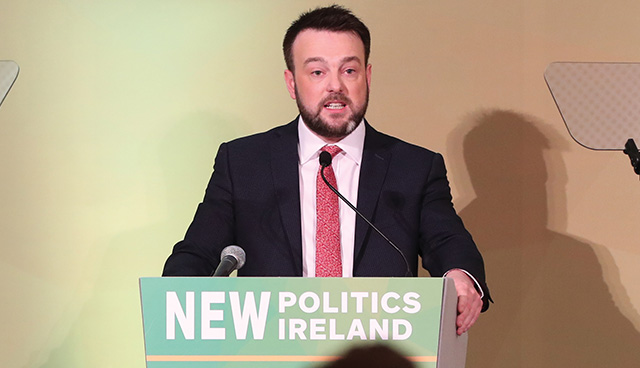SDLP: New politics, new Ireland


In what was the SDLP’s first party conference in two years and Colum Eastwood’s second as leader, agendaNi attends and takes the temperature of Northern Ireland’s third largest party.
The loss of the SDLP’s three Westminster seats last year in the context of a prolonged absence of an Assembly at Stormont has led many to question the direction and future of the SDLP. Prior to the conference rumours of a potential Fianna Fáil takeover or merger were rife. However, on the ground, party members stressed that the rumours were exactly that.
And so it proved, at the conference in Belfast there was a discernible absence of any discussion which would fuel speculation of a recalibrated SDLP. Instead the central message echoed much of what the party’s leadership has being saying in the media since the Assembly collapsed.
The potential to inject energy and emotive debate into the day was missed by the decision to defer a review of the party’s position on abortion to a special conference in May. Instead, the mood appeared rather routine as the party proposed and passed motions on the environment, policing and justice and social justice, with little or no debate.
The day’s programme touched on a variety of topics ranging from infrastructure, health and the economy, through to Brexit. Although it was the topic of social welfare reform which probably peaked the most interest. Various party members, including deputy leader Nichola Mallon, shared their accounts of the volume of work they are undertaking to protect vulnerable people against various welfare reform – in particular the assessment for Personal Independence Payment.
Mallon’s address marked the halfway point of the day and, in summary, outlined that the aspirations of the Good Friday Agreement have been hampered in enabling Northern Ireland to deliver its full potential.
The Deputy Leader concluded by calling on all party leaders to reaffirm their commitment to the Good Friday Agreement, outlining her belief that “we can once again use the Good Friday Agreement as a roadmap to reconciliation”.
Party leader Colum Eastwood also delivered his address with passion to echo that of Mallon’s. Addressing a full room, which had appeared sparsely populated throughout the earlier parts of the day, he prodded at the DUP and Sinn Féin rather than attacked. Setting a sombre tone on the recent status of Northern Ireland politics, Eastwood then outlined his belief that the Irish and British Governments, as co-guarantors of the GFA, should take more decisive action.
“There is time for a watching brief and there is a time for facilitation,” he said. “Now is the time for the guarantors to intervene actively and positively.”
Eastwood called for legislation to be introduced through the Intergovernmental Conference, mirroring much of that which was included in February’s failed draft accommodation.
On Brexit he described the instability around the withdrawal negotiations and around the GFA as “inextricably linked” and restated the party’s desire to see both the UK and Ireland remain in the customs union and single market, with a backstop of full economic alignment on the island.
In outlining his vision for a “new Ireland”, Eastwood called for the re-establishment of the New Ireland Forum. Addressing unionists, he added: “You belong to this place every bit as much as I do – therefore you have the very same right to shape the future of this island.”
Concluding, Eastwood once again referred back to the GFA: “Now is not the moment to give up on that Agreement – it’s the moment to fully embrace it.
“As change engulfs our islands, the three strands or relationships at its heart haven’t dated – they have truly come of age.
“In time, when we are forced to look history full in the eye, let us not say that we narrowed our minds and thus narrowed the horizon.”





